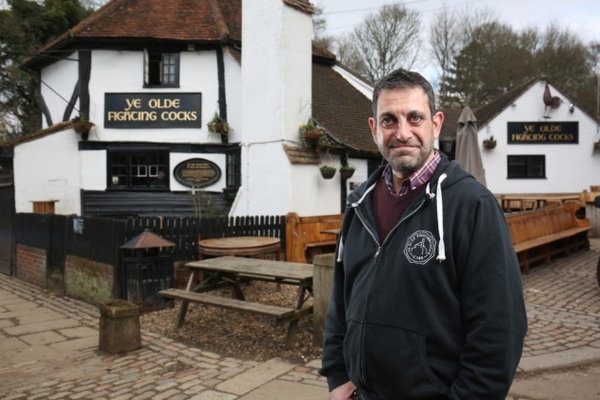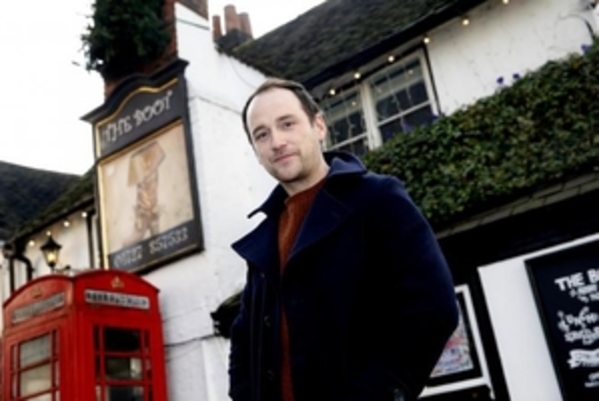St Albans publicans lead big rates fight
Added: Thursday, October 31st 2019

You could be forgiven for thinking that running a pub is a mug’s game. Christo Tofalli and Sean Hughes, who run Ye Olde Fighting Cocks and the Boot in St Albans, won national acclaim in 2019 when CAMRA awarded them jointly its prestigious Campaigner of the Year prize. It was in recognition of their vigorous efforts to reduce the punitive levels of business rates imposed on St Albans pubs.
What started as Save St Albans pubs has turned into a national campaign called Save UK Pubs. Christo and Sean have addressed rallies of fellow publicans from all parts of the country and have had meetings with Treasury officials. As a result, the parliamentary Treasury Select Committee is taking a detailed look at how business rates are threatening the future of thousands of pubs.
But there are far more financial burdens than rates when you’re running a leased pub owned by a pubco – in this case Mitchells & Butlers, who own the Fighting Cocks, and Punch controlling the Boot, though Sean is in the throes of the Boot switching from Punch to Heineken’s Star Bars & Pubs.
The duo rattle off the alarming number of imposts they have to pay: rent, insurance, fees for renewing leases with stamp duty on top, and payment for dilapidation reports. The figures are eye-watering. Christo pays £100,000 a year rent at the Fighting Cocks, Sean £70,000 at the Boot. They both have to find £10,000 a year for insurance, vital for ancient buildings with large amounts of wood in the shape of beams and posts. The costs of renewing a lease range from £9,000 to £15,000 and Sean now faces a £7,000 a year hike in his rent.
The additional burden of rates is the result of a government review of the system in 2017. The burden is not unique to St Albans pubs but the increases are exceptionally onerous as it’s an affluent city close to London, with some of the highest property prices in the country. Following the review, more than 40 per cent of local pubs had increases of 15 per cent, with 20 per cent facing bills in excess of 50 per cent.
Christo at the Fighting Cocks had a 50 per cent increase to £33,000 a year while the Boot had an even more astonishing rise of 87 per cent to £31,000 a year.
Faced by these mind-boggling figures, you might think the pair would run a mile from the pub trade. But they both love running pubs and there are compensations. They have the good fortune to work in a historic city founded by the Romans as Verulamium. Today there are Roman remains, a fine Roman museum and the imposing abbey cathedral. On the drinking front, there are 50 pubs offering a wide range of beer, an annual CAMRA beer festival and the head office of the Campaign.
“We run community pubs and we want our pubs to remain at the heart of the community,” Christo and Sean say – words that formed part of their pitch when they launched the save the pubs campaign.
Christo’s family came from Cyprus but he was born in Britain and grew up in Radlett, a few miles from St Albans. He’s 50 now and admits to having a “mid-life crisis”.
‘I was a commercial director – suits and an office – but it didn’t suit me. I did some bar work in a pub in Radlett and got the taste for the pub life. So seven years ago I got the lease on the Fighting Cocks and started to build the beer side and offer good food.”
He took over a pub that has a strong tourist trade. Ye Olde Fighting Cocks, according to the Guinness Book of World Records, is the oldest pub in Britain. This is disputed, with others claiming the title, including the Olde Trip to Jerusalem in Nottingham.
Christo is fiercely protective of his title and points to the long and detailed history, with the additional claim that it’s one of the oldest inhabited buildings in Europe. The building, now much expanded, started life as a dove cote in the grounds of the abbey in 793. Some of the current building dates from the 11th century. Following the dissolution of the monasteries under Henry VIII, the building moved a short distance down the hill to its present position on the edge of Verulamium Park. The inn today has old beams from the abbey along with pews from a local church. One area, lower than the rest of the building, was a cock-fighting pit: this “sport” was banned in 1849. The inn was known for a period as the Fisherman but has had its current name for many years, despite the merciful absence of cock fighting.

Sean Hughes is only 37 years old but he’s been involved in the pub trade for many years. His family come from the local area and his father Will worked in the Plough in the village of Sleapshyde.
“I saw the landlord writing a menu on a board one day and I was fascinated,” Sean says. “I ran two pubs in Welwyn then worked in the music industry for a while but took over the Boot in 2004.”
The Boot is another inn with some history behind it. It stands opposite the Clock Tower, built by local citizens early in the 15th century in defiance of the abbot who was the only person permitted to tell the time with a peel of bells. The Boot was built in the same period and it’s claimed that soldiers fighting in the first battle of the Wars of the Roses, which took place on nearby Bernards Heath, drank in the Boot in 1455.
“People call the Boot an inn,” Sean says, “but it’s only ever been an ale house and then a public house.” It’s a small pub dominated by a horseshoe bar but with plenty of wooden pews and open fires in the colder months. The walls are decorated with a medley of paintings and photos of both the pub and the city over many long years, while the low beams, on which many unwary first-time visitors crack their heads, indicate how much shorter our forebears were.
Both the Boot and the Olde Fighting Cocks were once owned by Benskins in Watford, the biggest brewery in Hertfordshire with an estate of 636 pubs. It became part of the national group Allied Breweries that included Ansells, Ind Coope and Tetley: Benskins closed in 1972.
Neither Sean nor Christo have market rent only options with their landlords but they have some freedom to buy in beers of their choice. At the Fighting Cocks, Christo has eight pumps for cask beer, though one is reserved for cider.
He trawls the country for interesting ales and gets them from as far away as Scotland while Tiny Rebel’s Cwtch from Wales is enjoyed by regulars.
“But a lot of tourists ask what are the locals beers,” he says. “Purity UBU is popular but my biggest seller is Farr Brew’s India Black Ale.”
Farr is based just a few miles from St Albans on a farm near Wheathampstead. The brewer’s Porter is also in demand and Christo is surprised but pleased that so many customers drink dark beers in the summer months. He has space, with a large beer garden, to stage regular beer festivals, music events and weekend BBQs.
At the Boot, Sean has 10 pumps for draught beer and cider. Oakham Citra is a permanent beer and he usually has beers from the major local Tring Brewery, plus 3 Brewers just outside St Albans, who have a Blonde and an IPA.
“I try to get Draught Bass when it’s available,” he says. “I’m going to offer Beavertown Neckoil – people who used to drink lager are now drinking Neckoil instead!”
While the Boot is a fraction of the size of the Fighting Cocks, Sean also stages live music events. Neither landlord is resting on his laurels. Sean and his family have a second pub in St Albans, Dylan’s Kings Arms, and at the start of 2019 they took over the Plough in Sleapshyde. Christo is going through the tortuous channels of planning permission to extend his beer garden and install a micro-brewery.
But they are keenly aware the future is not rosy for all pubs in the city and further afield. The launched Save St Albans pubs with an on-line petition in local pubs and it spread like a bush fire to many other towns and cities.
“If we don’t get a review of business rates then a lot of pubs will close,” they say. “The independent pub – and good choice for drinkers -- is under threat.”
All power to their collective elbows.
First published in BEER magazine, Winter 2019




